Leadership to Turn the Tide
A Chinese saying that I learned in childhood states: “Learning is like rowing upstream: not to advance is to drop back.”
The image of rowing upstream on a river is compelling to me. As I thought about it more, I realized that this image speaks to the broader metaphor of life as a journey. For some, the trip is smooth and scenic, and for others, it is turbulent or even terrifying. Some rivers are wide open, and some take twists and turns. For a few, to advance means powering up a yacht, but for many, it means futilely rowing against the current in small boats with broken oars.
My first teaching experience was volunteering at a remote school in Nepal Himalayas at 8000 feet, my school, which was falling apart, had no electricity or water. Most of the students and their families live well below poverty.
Yet in this tough environment, I discovered my calling—I knew I wanted to teach.
However, as I left this experience, I was unsettled by the difficult prospects of my students’ futures. Already one of the poorest nations in the world, Nepal
After this experience, I later returned to Taiwan Orchid Island , a place of breathtaking beauty, is home to the Dawu people, one of Taiwan Pacific Ocean make the Dawus a resilient and brave people.
However, what I experienced there was a sadness in the air. Taiwan
In both places, systemic issues that are deeply political and social, prevent my students from realizing their potential.
This “structural violence” is not uncommon. We can find similar situations here in New York
These problems may seem insurmountable, but we must face them. Beyond equipping individuals with better tools, hard work must be done to change the landscape–to carve out a more promising journey for our future generations. Activism, advocacy and policy work are essential for social change. And it takes leadership to turn the tide.
This is why I came to Teachers College, a school deeply rooted in its public purpose.
As we graduate from this fine institution today, I challenge us to reflect on this collective vision, this calling–how can we make a difference in this world? How will you serve? What is your mission?
Published Tuesday, Jun. 29, 2010
